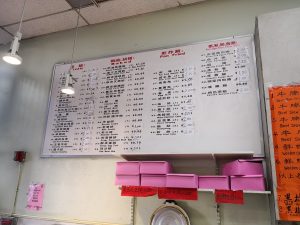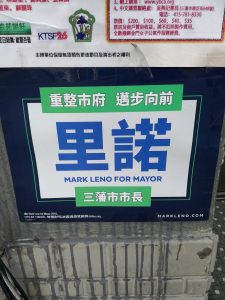San Francisco is one of the most ethnically diverse cities in America. The 1850s gold rush brought in treasure hunters both domestically and internationally, rapidly increasing the population and city development. As more urban constructions were initiated such as railroads, gold mine machinery and skyscrapers, massive amounts of labor are needed. That is when rumors about the American dream are spread to the far east. Tenths of thousands of Chinese were lured to the west coast and provided labors for the City construction. In the past 150 years, the Chinese has gathered between Bush Avenue and Telegraph Hill avenue, enclosing the Area within, and named it Chinatown. Through my humble observation over the past few weeks, I found that Chinatown has a unique Chinese culture that is different from any of other Chinese culture due to the influence of linguistic landscapes.
It is impossible to fully understand the Chinese culture without experiencing the authentic Chinese cuisines. There was a Chinese saying “名以食为天,” or in English “Hunger breeds discontentment.” The ancient Chinese believe that food is the founding stone of flourishing Chinese culture. As a result, almost half of the stores in Chinatown are grocery stores and restaurants. A few of my favorite includes the traditional Southern Chinese cuisine Dim Sum and the most well-known Central Chinese cuisine Hot Pot. It is well-known that Chinese food in Chinatown is much more authentic than those in the other places, because Chinatown restaurants serve mostly Chinese, while other Chinese restaurants target local Americans.
As a Chinese student, being able to live as close as one block away from Chinatown gives me a sense of security and a sense of coming home. However, while the food is more authentic and the faces around are more familiar, I found living in Chinatown almost like living in a foreign country, mostly because of the language barrier between Chinatown and the “outside world.” Early Chinese immigrants were, without exception, from Guangdong province, where the official language is Cantonese, a majorly different dialect from Mandarin. From then on, Cantonese has been the dominant language in Chinatown. Signs are written in traditional Chinese characters, and town folks bargain loudly in Cantonese. Undoubtedly Cantonese is both the official language and working language in Chinatown.
One of my favorite bilingual signs in Chinatown is the political campaign signs. Mark Leno is a California state senator who is running for the San Francisco city mayor position. Chinatown, as one of the most populated areas in the city, is extra crucial to his campaign. His campaign post transliterated his last name into two powerful characters to gain support in Chinatown. He also translated his campaign slogan to Chinese which I wasn’t able to find the original English text. Perhaps this Chinese slogan is the original text. This idea is also illustrated in Jennifer Leeman and Gabriella Modan’s article, that “material realizations of language are strategic tools that are wielded in local politics, power struggles, and competing claims to space” (Leeman and Modan 333). Overall I think this is evidence that Chinatown and Cantonese plays a significant role in San Francisco city culture
.
Other languages also play significant roles in the Chinatown community. Chinatown is a famous city attraction that draws more tourists than the golden gate bridge annually. Since English is the universal language spoken around the globe, many stores were able to communicate with the tourist in fluent English. Menus are written in both Cantonese and English, and waiters serve in both language as well. In fact, most residents in Chinatown are second-generation immigrants who were born and raised in America, where they have picked up English either in school or in daily life.
Mandarin, on the other hand, is more like an outcast language in Chinatown, even though it is much similar to Cantonese linguistically. My last experience in a Szechuan food restaurant, the waiter couldn’t communicate with me in Mandarin but instead talked back to me in English to ask me for orders. In my opinions, this is mainly because of the small mandarin speaking population in San Francisco 20 years ago. Thus, there is no need for Chinese restaurant workers to learn Mandarin to serve customers.
In comparison, San Francisco Chinatown reminds me of Hong Kong, mostly because of the language and the culture preserved. It has some of the most authentic Chinese food in town, which also draws the similarities between the two cities that are far apart. However, San Francisco Chinatown is more inclusive in terms of English speakers, while Hong Kong seems to be influenced more by the mainland mandarin language. In conclusion, this Chinatown remained a unique cultural Icon of the far east in downtown San Francisco.
Citation:
Leeman, Jennifer, and Gabriella Modan. “Commodified language in Chinatown: A contextualized approach to linguistic landscape.” Journal of Sociolinguistics 13.3. (2009).

I thought it was interesting that even within Chinatown there is still a language barrier depending on what dialect of Chinese someone speaks. I also found it interesting that Chinese has such a influence over the area that political campaigns were translated into Chinese. I feel like this is on par with what the article was saying. Even at a political level, residents of the area are still committed to keeping the Chinese in the area alive and well, whether that is for a symbolic economy or preserving culture.
I find your line “Cantonese is both the official language and working language in Chinatown” very intriguing. Often when I think of a place having an official language that language is linked to a government, a nation in a legal sense. Perhaps Chinatown is a bit like its own nation, a safe haven from an overbearing American culture where people can feel more secure and at home, as you said of yourself. Great post!
I really liked reading about the comfort you’ve found living so close to Chinatown in SF, as a Chinese international student. It’s amazing how deeply authentic such an area can be, between the language and environment.
Hi Jeffery!
Thank you for writing such a well-research, well-constructed opinion piece. I visited China town in San Fransisco a little bit more than a year ago and do remember feeling like I had stepped into another city.
I wonder if you have been to little Italy yet? It would be cool to compare the differences and similarities between the linguistic landscape of each? Is one more gentrified or preserved than the other? Are there shared elements between the two?
As someone who is staying in Hong Kong for the internship, I also think it is interesting that the Cantonese dialect takes precedence over Mandarin even though Mandarin is more widely used throughout the world. It is interesting that Mark Leno is utilizing the linguistic landscape of Chinatown to promote his campaign, which I think should be helpful in giving Chinese families a political voice if he wins. I also think your brief description of the gold rush and immigration flow in San Francisco explained a lot about the use of languages there.
Hi Jeffrey! I loved reading your post especially since I was interning in San Francisco last summer so I felt like I could relate to a lot of what you said! Out of all the different Chinatowns I’ve been to I found San Francisco’s Chinatown to be my most favorite especially like you said it is a unique cultural icon of the far east in San Francisco. One thing I love about Singapore is since it is such a diverse country it is made up of different ethnic towns such as they have an Arab town, Little India and a Chinatown. I have loved visiting these places so much because it feels as if you are living in another foreign country as you mentioned. I am so happy you are having a great experience living in San Francisco as it is by far one of my favorite places and I really enjoyed your post!
Hi Jeffrey! I had so much joy reading about your experience in San Francisco Chinatown. It is interesting how food can bring co many cultures and people together despite geographic location. This weekend, my roommate and I had lunch at a dim sum place nearby, and even though the menu was in Chinese only, but we saw many foreigners waiting in line. Like you said, “food is the founding stone of flourishing Chinese culture”. Through food, we get to learn and understand so much more beyond the surface of any culture, because food is like an experience. Good luck and enjoy the rest of your internship and summer!
Hey Jeffrey,
Glad you are enjoying your time in San Francisco, it was amazing that you get to live close to Chinatown where you can get to eat Chinese traditional food every day! I have heard how California is the state with the most Asian population in America. I am happy to hear how the Chinatown in San Francisco is still able to keep its Chinese culture by still have signs written in traditional Chinese character and people bargaining in Cantonese. This is different from what I notice for Chinatown in New York where it is becoming more westernized due to gentrification. However, there are still parts like Flushing where it is still able to keep the Chinese culture.
I really enjoyed reading about your experience in San Francisco and am glad that you are having a great time! Not coming from a Chinese background, I found your observations and analysis of Chinatown in downtown San Francisco to be very interesting. From your personal experience in Chinatown, it would appear that Chinatown is a commodification of the Chinese culture to attract tourists more than people with Chinese heritage since a tourist would not be able to identify Cantonese, which is used instead of Mandarin but only understand the neighborhood to be a representation of the Chinese culture. It is reflective of the main theme of the reading and also apparent in the different cultural neighborhoods in New York City.
I went to San Francisco and Chinatown when I was 9, but as an English only speaker, I did not understand what the language differences could mean for someone who speaks Mandarin v Cantonese. I liked reading your perspective.